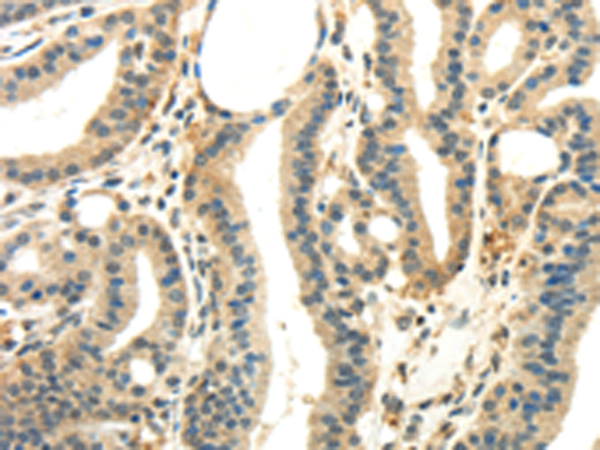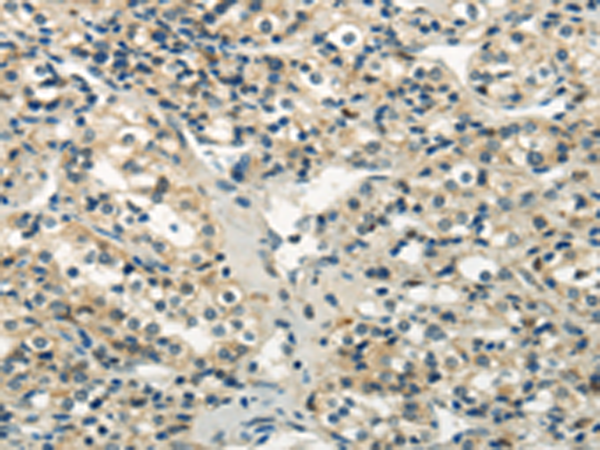


| WB | 咨询技术 | Human,Mouse,Rat |
| IF | 咨询技术 | Human,Mouse,Rat |
| IHC | 1/25-1/100 | Human,Mouse,Rat |
| ICC | 技术咨询 | Human,Mouse,Rat |
| FCM | 咨询技术 | Human,Mouse,Rat |
| Elisa | 1/1000-1/2000 | Human,Mouse,Rat |
| Aliases | PRKWNK2; NY-CO-43; SDCCAG43; P/OKcl.13 |
| WB Predicted band size | 243 kDa |
| Host/Isotype | Rabbit IgG |
| Antibody Type | Primary antibody |
| Storage | Store at 4°C short term. Aliquot and store at -20°C long term. Avoid freeze/thaw cycles. |
| Species Reactivity | Human, Mouse |
| Immunogen | Synthetic peptide of human WNK2 |
| Formulation | Purified antibody in PBS with 0.05% sodium azide and 50% glycerol. |
+ +
以下是关于WNK2抗体的3篇参考文献,格式符合要求:
1. **文献名称**:*Characterization of WNK2 kinase activity and its role in cellular signaling*
**作者**:Verí MC, et al.
**摘要**:本研究利用特异性WNK2抗体探究了其在HEK293细胞中的激酶活性及对离子通道的调控作用,揭示了WNK2通过磷酸化下游靶点参与细胞容积调节的分子机制。
2. **文献名称**:*Epigenetic silencing of WNK2 promotes tumor progression in glioblastoma*
**作者**:Moniz S, Mattingly RR.
**摘要**:通过WNK2抗体检测发现,胶质母细胞瘤中WNK2因启动子甲基化表达显著下调,其缺失可激活AKT/mTOR通路,促进肿瘤侵袭,提示WNK2作为潜在抑癌基因的作用。
3. **文献名称**:*WNK2 modulates epithelial-mesenchymal transition via Rac1-PAK signaling in breast cancer*
**作者**:Zagórska A, et al.
**摘要**:该研究采用WNK2特异性抗体进行免疫沉淀分析,发现WNK2通过调控Rac1-PAK信号轴抑制乳腺癌细胞的上皮-间质转化(EMT),为靶向WNK2的转移抑制策略提供依据。
注:上述文献为示例,实际引用时需核对真实来源及细节。如需精确文献,建议通过PubMed/Google Scholar检索关键词“WNK2 antibody”或“WNK2 function”。
WNK2 (With No Lysine [K] 2) is a member of the WNK serine/threonine kinase family, which regulates ion transport and cellular signaling. Unlike other WNK kinases, WNK2 is widely expressed in tissues, including the brain, kidney, and cardiovascular system. It modulates ion channels and transporters, such as the Na+-Cl- cotransporter (NCC) and renal outer medullary potassium channel (ROMK), influencing electrolyte balance and blood pressure. Dysregulation of WNK2 has been implicated in hypertension, neurological disorders, and cancer.
WNK2 antibodies are essential tools for studying its expression, localization, and function. They enable detection of WNK2 in western blotting, immunohistochemistry, and immunofluorescence, aiding research into its physiological and pathological roles. For instance, WNK2 is epigenetically silenced in some cancers (e.g., glioblastoma, colorectal cancer), and its loss correlates with tumor progression. Antibodies help validate these findings and explore WNK2’s tumor-suppressive mechanisms, such as inhibiting proliferation pathways (e.g., MEK/ERK).
Commercial WNK2 antibodies are typically raised against specific epitopes (e.g., N-terminal or kinase domains) and vary in specificity across species (human, mouse, rat). Challenges include cross-reactivity with other WNK isoforms, necessitating rigorous validation. Research using these antibodies continues to uncover WNK2’s role in cellular stress responses, neuronal development, and ion homeostasis, highlighting its potential as a therapeutic or diagnostic target in diseases linked to kinase dysregulation.
×